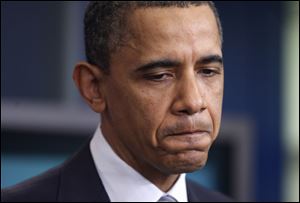
Shutdown looms as lawmakers battle over cuts
4/6/2011
Irritated by lengthy dickering on the budget, President Obama demands congressional leaders 'act like grown-ups.' He has invited them back to the White House.
WASHINGTON -- The first federal government shutdown in more than 15 years drew closer Tuesday as President Obama and congressional leaders failed to make progress after back-to-back meetings at the White House and on Capitol Hill.
Mr. Obama and Congress remained billions of dollars apart and at odds over where to find savings after an 80-minute West Wing meeting that included House Speaker John Boehner (R., Ohio) and Senate Majority Leader Harry Reid (D., Nev.).
In the meeting, Mr. Boehner floated the possibility that he may seek as much as $40 billion in cuts, $7 billion more than the two sides have been discussing for the past week.
Irked by the prolonged negotiations, Mr. Obama demanded the congressional leaders "act like grown-ups."
"If they can't sort it out, then I want them back here tomorrow. And if that doesn't work, we'll invite them again the day after that," the President said hours after the meeting.
He invited congressional leaders back to the White House Wednesday, but he is scheduled to spend much of the day traveling and, as of late last night, no meeting had been finalized.
At issue is legislation needed to keep the federal government running through the Sept. 30 end of the budget year, or a stopgap funding measure to delay the Friday midnight deadline for the shutdown to take effect.
Mr. Boehner pledged to keep talking.
His aides deflected reports that the speaker is setting a new target of $40 billion in cuts, but he rejected the $33 billion figure that Republican leaders in the House and Democratic leaders in the Senate had been working toward.
"There was no agreement, so those conversations will continue. We made clear that we're fighting for the largest spending cuts possible," Mr. Boehner said.
Mr. Reid accused Republicans of not being "fair and reasonable" in their demands for higher cuts and specific changes to social and regulatory policies.
Asked if he would be willing to reach $40 billion in cuts, however, Mr. Reid demurred. "I'm not negotiating here what we're going to do ultimately," he said.
A late-day meeting between the two congressional leaders produced no breakthroughs, but aides to both issued identical statements calling it "a productive discussion."
Mr. Reid closed the Senate chamber last evening with an optimistic speech describing "good faith" talks that are "not that far apart."
"The government is not going to shut down -- yet. There's still air in the tire; at least we still have some miles to travel. I hope we have enough air in the tire to get us where we need to go," he said.
Without any resolution -- either through a full spending plan or another short-term extension -- the federal government would shut down at midnight Friday, with the full impact realized when the workweek resumes Monday.
Many of the most immediate effects of a shutdown would be felt in Washington, where the Smithsonian Institution museums and other tourist sites would close, keeping as many as 500,000 visitors locked out of the city's main attractions, senior government officials said.
If the impasse continues until Monday, a slew of other services would be halted, including the processing of tax refunds.
Aside from agreeing on how much to cut, two key stumbling blocks remain.
One is a demand by Democrats to include roughly $10 billion in one-time cuts from programs such as Pell grants and farm subsidies. Republicans have rejected those cuts because they wouldn't be permanent.
Mr. Boehner called such proposals "smoke and mirrors."
Republicans cited the suggested cuts to rebut Mr. Obama's oft-repeated claim that he has met the GOP "more than halfway" to its goal of cutting $61 billion from the government.
Mr. Obama rejected that outlook Tuesday, calling his proposed Pell grant reductions "real cuts."
Another impediment to a deal is Mr. Boehner's insistence on attaching what are known as policy riders to the legislation.
One such provision, approved as an amendment to the House bill in February, would keep open a mountain repository outside Las Vegas for storage of high-level nuclear waste -- a plan Mr. Reid absolutely opposes for his state.
White House officials privately acknowledged they have become wary of the political consequences of the spending battle, in part because a shutdown would reinforce the notion for many voters that leaders in Washington are unable to resolve key issues.
Meanwhile, White House officials are reluctant to agree to proposals that would inflame Mr. Obama's liberal base, especially during the same week that the president launched his re-election campaign with a direct appeal to core supporters who provided the energy for his 2008 bid.
Mr. Boehner has struggled with his own political base, most prominently the Tea Party activists who propelled the major Republican victories in the 2010 midterm elections.
Some of the 87 Republican freshmen who benefited from Tea Party support have resisted any compromise to their campaign pledge to slash spending to 2008 levels.
Many freshmen, however, are open to some form of compromise, though they aren't sure about the right mix of spending cuts and policy riders.
Mr. Boehner still has not sought input from the freshmen about where they would make deals, they said. Instead of directly seeking their support for a specific plan, Mr. Boehner has made it clear that some kind of compromise is necessary, according to Rep. Kevin Yoder (R., Kan.).
He rejected the idea of "let's shut down the government as a means to an end," because at some point, he noted, the House and the Senate will have to govern before the 2012 elections.